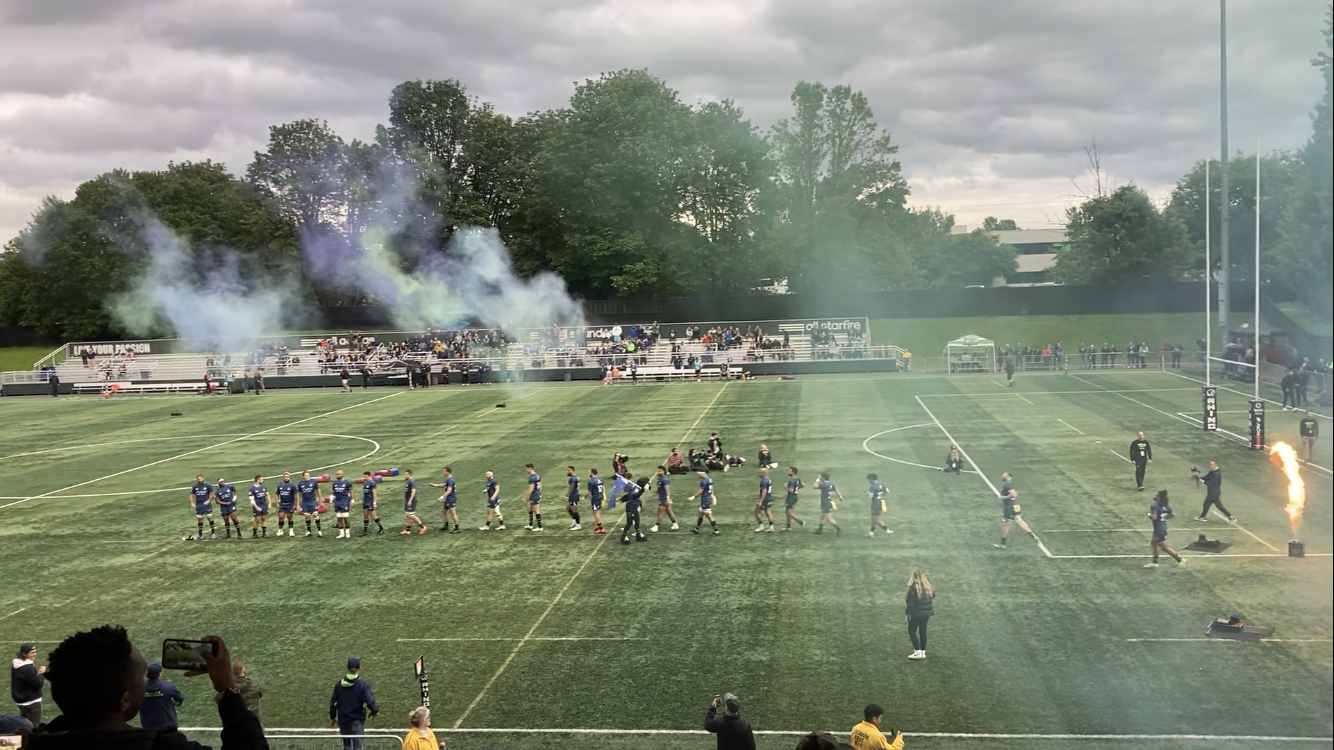
Guest blogger, David Drown details the experience attending the Seawolves’ Western Conference Semifinal—his first ever rugby match.
My first time going to a Seattle Seawolves match was a lot like my first time going to a Seattle Sounders match: both were playoff matches and both were unforgettable. But what set the Seawolves apart was its intimacy. The ability for a stadium a fraction of the size of most pro arenas to produce such a vibrant atmosphere left me questioning the value we place on our big box entertainment venues.
Don’t get me wrong, watching a professional sport alongside 30,000+ screaming fans in an architectural superstructure is an incomparable experience. But as stadiums grow in size and amenities, the actual sport itself often becomes lost amidst the fanfare. All kinds of distractions seep in, forcing your attention toward everything but the game. What I experienced this past Sunday in Tukwila felt like the antithesis to that. Watching the Seawolves in the Western Conference Semifinal at Starfire Stadium felt like a return to the purity of sport, a practice in athletic mindfulness that reoriented the fan-athlete relationship and reminded me of why we even show up in the first place.
The threat of rain loomed overhead as my partner and I made our way to the front gate of Starfire, a common backdrop for many Seattle sporting events. Teenagers tossed a rugby ball back and forth in the parking lot, weaving their way in and out of the sea of couples, families, and groups of friends funneling toward the stadium. I studied their movements in detail, hoping to get a crash course in the general flow of rugby before watching my first ever match.
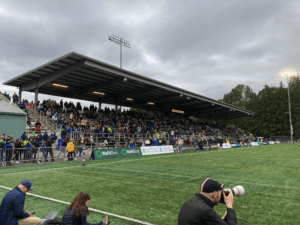 Before I knew it, we were inside the stadium. But something about that distinction didn’t feel right. Unlike most sports venues, there wasn’t a clear boundary between inside and out. The grounds felt open and fluid, almost indistinguishable from the surrounding neighborhood. This feeling extended to the Starfire staff themselves, with ticket sellers, concessions operators, and merch vendors all operating like a tight community—like they knew each other well beyond their occupations. After exploring the merch tents, we grabbed ourselves a couple of drinks and a giant pretzel for pennies on the dollar and headed for our seats.
Before I knew it, we were inside the stadium. But something about that distinction didn’t feel right. Unlike most sports venues, there wasn’t a clear boundary between inside and out. The grounds felt open and fluid, almost indistinguishable from the surrounding neighborhood. This feeling extended to the Starfire staff themselves, with ticket sellers, concessions operators, and merch vendors all operating like a tight community—like they knew each other well beyond their occupations. After exploring the merch tents, we grabbed ourselves a couple of drinks and a giant pretzel for pennies on the dollar and headed for our seats.
The thundering roar of fireworks announced the introduction of the Seawolves. Fans stood and cheered wildly, many still pinching themselves, happy to be back in the postseason. John, a season ticket holder from West Seattle and Seawolves fan since day one, explained that “last season was a tough one… [but] it’s good to see all the fans out tonight.” What sets Seawolves games apart for John is the camaraderie, even “the way [opposing] fans are welcomed” here at Starfire. There isn’t the fan aggression you might encounter at some other professional sporting events. “There’s something special here,” John says.
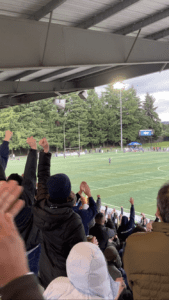 The match began with a flurry of action. Their opponent, the San Diego Legion, took an early lead, making a try just a few minutes into the first half. Even as a new fan my heart sunk, worried that this could spell the beginning of a long and painful night. But the Seawolves answered back and then kept answering back. Soon they were ahead with what felt like a comfortable lead heading into halftime. I hesitated to get too excited though. Superstitious tendencies from my days religiously following my favorite hockey team bubbled to the surface. Just 40 minutes into my time at Starfire and I felt a connection with the sea of green and blue filling the stands, and I hesitated to say anything that might jinx the game.
The match began with a flurry of action. Their opponent, the San Diego Legion, took an early lead, making a try just a few minutes into the first half. Even as a new fan my heart sunk, worried that this could spell the beginning of a long and painful night. But the Seawolves answered back and then kept answering back. Soon they were ahead with what felt like a comfortable lead heading into halftime. I hesitated to get too excited though. Superstitious tendencies from my days religiously following my favorite hockey team bubbled to the surface. Just 40 minutes into my time at Starfire and I felt a connection with the sea of green and blue filling the stands, and I hesitated to say anything that might jinx the game.
At the start of the second half, we made our way down behind the endzone to get closer to the action. The Seawolves maintained their momentum, charging back and forth down the pitch with ease. A young fan next to me piped up, “Come on dad!”, as the horde of giant players tumbled toward us. It marked a surreal moment when the lives of the professional athletes transcended the pitch. Not something usually experienced in giant sports stadiums, I suddenly looked around and realized that many of the people near me had direct connections with the players; some even family; some even “dad.”
What just 50 minutes before looked like a mess of players frantically running about knocking into one another quickly crystallized into an organized sway of forces. The flow of the game has a way of revealing itself even if you have no knowledge of strategy. The groups of players move about the pitch like flocks of starlings, their murmurations crafting complex shapes and patterns that ask the viewer to let go of rigid expectation. “Rugby is a continuous play sport,” describes Brent, a Seawolves fan and wheelchair rugby player, “those types of sports [just] take longer to gain traction.” But like most Seawolves fans, Brent is optimistic that the Seattle area is becoming more open to this often underappreciated game.
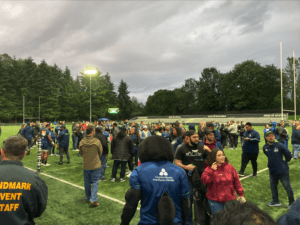
It became clear well into the second half that this was a night for celebration. As we hit the 80 minute mark the game ended just as it began, with a thunderous display of fireworks. The final score, Seawolves 43 – Legion 19. Standing along the perimeter of the pitch transfixed by the lights and sounds, my partner and I were caught off guard when the gate suddenly opened and fans rushed out onto the grass to congratulate the players. This sort of interaction was so foreign to us. Fans are fans and athletes are athletes, we thought. But Starfire seemed unconcerned with that distinction which pervades so much of pro sports.
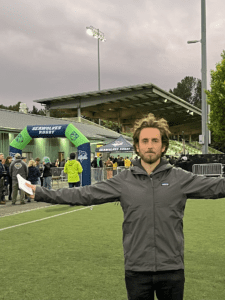 After we made our way back through the parking lot, I worked my way through memories from the night. I tried parsing out the moments, segmenting the groups of fans, sectioning off chunks of time in an attempt to more easily understand the night. But this felt counter to what I had just experienced. It quickly became evident to me that what separated watching a Seawolves match from other pro sporting events was its very lack of separateness at all levels. From the openness of the stadium to the interaction between players and fans, there was no clear beginning or end to the Seawolves experience. The Seawolves are a team within a family, within a community; there is no division; there are no distractions. This is sport at its essence.
After we made our way back through the parking lot, I worked my way through memories from the night. I tried parsing out the moments, segmenting the groups of fans, sectioning off chunks of time in an attempt to more easily understand the night. But this felt counter to what I had just experienced. It quickly became evident to me that what separated watching a Seawolves match from other pro sporting events was its very lack of separateness at all levels. From the openness of the stadium to the interaction between players and fans, there was no clear beginning or end to the Seawolves experience. The Seawolves are a team within a family, within a community; there is no division; there are no distractions. This is sport at its essence.
With this huge first round win, the Seawolves head to Houston to take on the SaberCats in the Western Conference Final on Saturday, June 18th at 4pm. Head over to Billy Baroo’s in Tukwila for the official watch party where the Seawolves community will come out in full force—including Rucky, the beloved team mascot—to cheer on the hometown heroes.
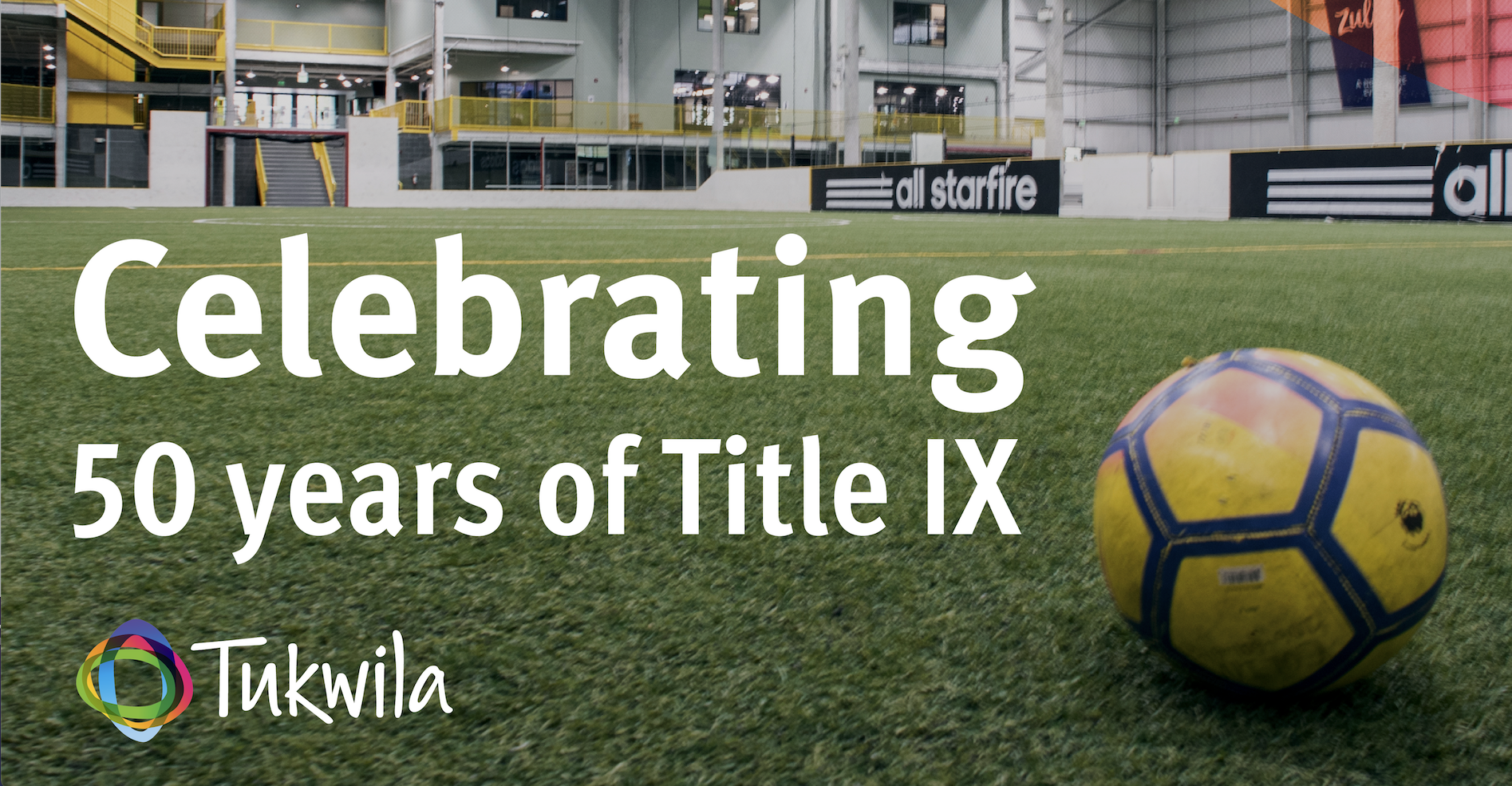
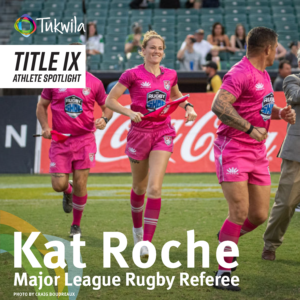 Kat Roche, Major League Rugby Referee
Kat Roche, Major League Rugby Referee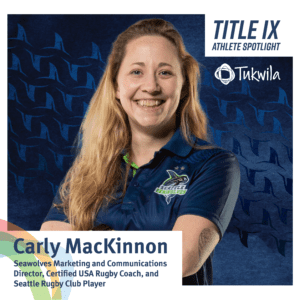 Carly MacKinnon, Seawolves Marketing and Communications Director
Carly MacKinnon, Seawolves Marketing and Communications Director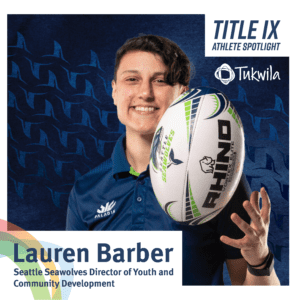 Lauren Barber, Seawolves Director of Youth and Community Development
Lauren Barber, Seawolves Director of Youth and Community Development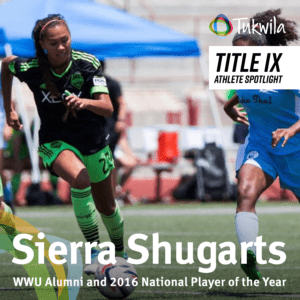 ierra Shugarts, WWU Alumni and 2016 National Player of the Year
ierra Shugarts, WWU Alumni and 2016 National Player of the Year

 Before I knew it, we were inside the stadium. But something about that distinction didn’t feel right. Unlike most sports venues, there wasn’t a clear boundary between inside and out. The grounds felt open and fluid, almost indistinguishable from the surrounding neighborhood. This feeling extended to the Starfire staff themselves, with ticket sellers, concessions operators, and merch vendors all operating like a tight community—like they knew each other well beyond their occupations. After exploring the merch tents, we grabbed ourselves a couple of drinks and a giant pretzel for pennies on the dollar and headed for our seats.
Before I knew it, we were inside the stadium. But something about that distinction didn’t feel right. Unlike most sports venues, there wasn’t a clear boundary between inside and out. The grounds felt open and fluid, almost indistinguishable from the surrounding neighborhood. This feeling extended to the Starfire staff themselves, with ticket sellers, concessions operators, and merch vendors all operating like a tight community—like they knew each other well beyond their occupations. After exploring the merch tents, we grabbed ourselves a couple of drinks and a giant pretzel for pennies on the dollar and headed for our seats.  The match began with a flurry of action. Their opponent, the San Diego Legion, took an early lead, making a try just a few minutes into the first half. Even as a new fan my heart sunk, worried that this could spell the beginning of a long and painful night. But the Seawolves answered back and then kept answering back. Soon they were ahead with what felt like a comfortable lead heading into halftime. I hesitated to get too excited though. Superstitious tendencies from my days religiously following my favorite hockey team bubbled to the surface. Just 40 minutes into my time at Starfire and I felt a connection with the sea of green and blue filling the stands, and I hesitated to say anything that might jinx the game.
The match began with a flurry of action. Their opponent, the San Diego Legion, took an early lead, making a try just a few minutes into the first half. Even as a new fan my heart sunk, worried that this could spell the beginning of a long and painful night. But the Seawolves answered back and then kept answering back. Soon they were ahead with what felt like a comfortable lead heading into halftime. I hesitated to get too excited though. Superstitious tendencies from my days religiously following my favorite hockey team bubbled to the surface. Just 40 minutes into my time at Starfire and I felt a connection with the sea of green and blue filling the stands, and I hesitated to say anything that might jinx the game.
 After we made our way back through the parking lot, I worked my way through memories from the night. I tried parsing out the moments, segmenting the groups of fans, sectioning off chunks of time in an attempt to more easily understand the night. But this felt counter to what I had just experienced. It quickly became evident to me that what separated watching a Seawolves match from other pro sporting events was its very lack of separateness at all levels. From the openness of the stadium to the interaction between players and fans, there was no clear beginning or end to the Seawolves experience. The Seawolves are a team within a family, within a community; there is no division; there are no distractions. This is sport at its essence.
After we made our way back through the parking lot, I worked my way through memories from the night. I tried parsing out the moments, segmenting the groups of fans, sectioning off chunks of time in an attempt to more easily understand the night. But this felt counter to what I had just experienced. It quickly became evident to me that what separated watching a Seawolves match from other pro sporting events was its very lack of separateness at all levels. From the openness of the stadium to the interaction between players and fans, there was no clear beginning or end to the Seawolves experience. The Seawolves are a team within a family, within a community; there is no division; there are no distractions. This is sport at its essence.